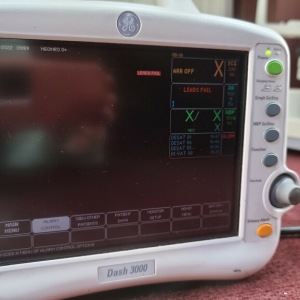Description
1) Introduction
EKG2000 is 12ch ECGs equipment which measure and record ECGs of the patient.
EKG2000 provides users with ECGs record of the patient, measurement parameters for diagnosis and auto analysis. Patient information and user identification printed along with ECGs on the output report is effective for hospital chart control. For convenient operation, ECGs can be measured and recorded by pressing short key. Then, ECGs
is printed in A4 sized report form after applying filter, calculating the measurement parameter and auto analysis. In addition to an AC power, it can be continuously operated with a built-in rechargeable battery. This enables the EKG2000 to be used in an ambulance, in a visit to patients or during patient transportation.
2) Features of the equipment
12 channel ECGs is printed in a various channel form of 3ch+1rhy, 6ch+1rhy, 12ch rhy, 60s 1rhy in A4 sized report form.
1. 1 channel rhythm is recorded for 60 seconds and printed in A4 sized report form.
2. 12 channel rhythms are printed simultaneously and continuously in real time..
3. Measurement parameters such as heart rate, PR interval, QRS duration, QT/QTc, P-R-T axes
required for diagnosis is printed along with ECGs on the output report after calculating
automatically.
4. Auto analysis enables 75 diagnosis.
5. For convenient diagnosis, ECGs can be printed after changing system setting such as filter, signal level, printing speed, channel form, rhythm cannel of the recorded ECG data.
6. Easy to carry with built-in rechargeable battery.
7. Patient information and user identification can be entered and printed along with ECGs for effective hospital chart control.
Indications
The ECG has proven to be among the most useful diagnostic tests in clinical medicine. The ECG is now routine in the evaluation of patients with implanted defibrillators and pacemakers, as well as to detect myocardial injury, ischemia, and the presence of prior infarction as well. In addition to its usefulness in ischemic coronary disease, the ECG, in conjunction with ambulatory ECG monitoring, is of particular use in the diagnosis of disorders of the cardiac rhythm and the evaluation of syncope.
Contraindications
No absolute contraindications to performing an electrocardiogram, other than patient refusal, exist. Some patients may have allergies, or more commonly, sensitivities to the adhesive used to affix the leads; in these cases, hypoallergenic alternatives are available from various manufacturers.


















